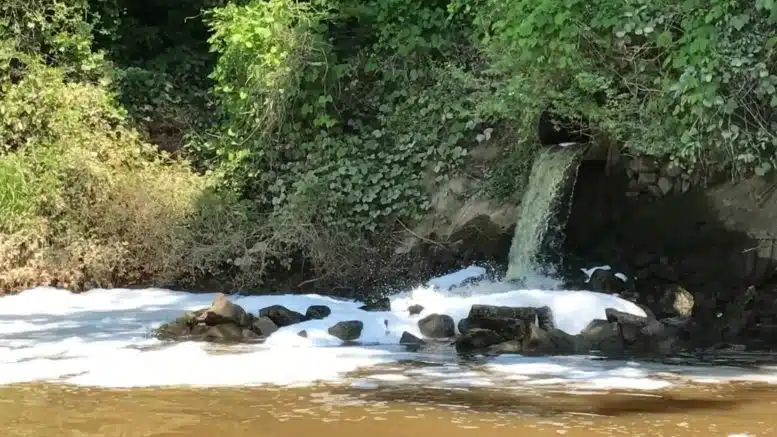By Will Atwater
On Wednesday, state lawmakers discussed this year’s regulatory reform bill and, despite a bevy of amendments and question marks about its effects on the environment and potential conflicts with the Clean Water Act, the bill received a favorable report and is moving on in the state Senate.
At first glance, House Bill 600 appears poised to weaken some hard-won protections dealing with water runoff and quality issues. In the coming days, representatives from the state’s environmental community will attempt to weigh in on the proposed legislation.
One lawmaker who raised concerns during the discussion in the Senate Judiciary Committee is Natasha Marcus ((D-Davidson). Initially, Marcus directed her attention to language that, in part, would limit the N.C. Department of Environmental Quality’s ability to regulate how much chemical discharge that industry can dump into state waterways.
Some of the chemicals lawmakers were fretting about include per- and polyfluoroalkyl substances, known PFAS in the scientific community and as “forever chemicals” commonly because of their persistence in the environment.
“Section seven, I think, relates to this committee’s work,” Marcus said. “It prohibits DEQ from limiting PFAS levels by law and other toxic chemicals, and I think that’s a big problem.”
Brooks Rainey Pearson, a lobbyist for the Southern Environmental Law Center, shares Marcus’ concern.
“[It] would disallow DEQ from writing permits for chemicals that don’t have numeric standards,” Rainey Pearson said. “This includes all of the PFAS chemicals [and]1.4 dioxane … those would not be able to be limited in discharge permits.”
“And I don’t think anybody actually wants that,” Rainey Pearson said. “The legislative bodies should not want that. All of their constituents benefit from DEQ being able to limit harmful pollution in their drinking water.”
The not-too-distant past
Discussion of the Regulatory Reform Act of 2023 comes a week after NC Health News reported that Chemours, DuPont and Corteva announced a billion-dollar settlement fund to address pending lawsuits brought on behalf of several states, environmental advocacy groups and individuals.
The proposed bill’s discussion also follows a protest rally held in Fayetteville, near the Chemours Fayetteville Works Facility. The protest organized by North Carolina Stop GenX in Our Water took place on June 10, which was the sixth anniversary of the discovery of PFAS in the Cape Fear River.
The environmental advocacy group, along with other groups based in the Cape Fear River basin, has worked to spread awareness about PFAS and to hold Chemours accountable for polluting the Cape Fear River as well as fouling the air, soil and groundwater with particulate matter emitted from its Fayetteville Works facility.
Although all the health effects of PFAS are not yet known, the Centers for Disease Control and Prevention says they are believed to impact the immune system and may reduce antibody responses to vaccines.
Additionally, a 2021 study suggests a possible link between childhood exposure to PFAS and the development of hyperlipidemia and cardiovascular disease later in life.
Research on laboratory animals has found a link between PFAS and liver, kidney, testicular, pancreas and thyroid cancers. Studies also suggest that PFAS can cause high cholesterol, pregnancy problems and immune suppression.
A call to action
Given the state’s recent history with PFAS and other water quality issues, it’s understandable that some would have strong reactions to parts of House Bill 600.
“Forever chemicals like PFAS are a serious concern. I am disappointed but not necessarily surprised that the Republican supermajority would block NCDEQ’s ability to protect the public from these carcinogens and contaminants,” Marcus said in an email to NC Health News.
Cape Fear River Watch, a Wilmington-based environmental advocacy organization, issued a call to action hours after the Judiciary Committee meeting concluded. A statement sent out to supporters reads: “Practically speaking, this amendment would mean that toxic chemicals without numeric standards (like PFAS, 1,4-dioxane, etc.) could not be limited in discharge permits — resulting in free-flowing toxic contamination.”
The organization said the provisions in the bill would be “in blatant violation of the Clean Water Act.”
“None of the permits that DEQ has issued on Chemours to this point would have been legal under this rule!!” the statement continued.
The group encourages supporters to add their names and comments to an electronic letter that Cape Fear River Watch is sending to lawmakers to express their opposition.
A break for large hog farms?
Marcus and others also point to issues in another section of the bill that, they argue, would weaken DEQ’s ability to enforce federal and civil rights laws on the massive hog farms that dot the landscape throughout eastern North Carolina.
The proposed bill could have a chilling effect on efforts by environmental activists and rural communities of color. They have long fought for protection from uncovered hog lagoons and spray fields, which have contaminated the environment and affected the quality of life of those who live near the massive hog farming operations.
Critics argue section 12(b)(c) is at odds with Title VI of the Civil Rights Act. Specifically, an executive order signed by former president Bill Clinton, established in 1994, “Direct[s] Federal agencies to incorporate achieving environmental justice into their mission.”
That order also requires that entities that receive federal funding “that affect human health or the environment do not directly, or through contractual or other arrangements, use criteria, methods, or practices that discriminate on the basis of race, color, or national origin.”
Sen. Norman W. Sanderson (R-Minnesott Beach), who presided over the proceedings, acknowledged that the bill has a way to go before it’s ready to be voted on. He said that he and other bill sponsors are working to make sure that environmental safeguards will not be lost.
“We are really tuned into PFAS [and] we’re still working with DEQ to make sure that they’re OK with [the bill]. So we’re not through with it yet,” Sanderson said. He noted that the bill has to get through another committee before reaching the floor of the Senate for a vote. “Conference [committee] is probably where we’re going to make the final changes.”
Sanderson admitted that addressing stakeholders’ and lawmakers’ concerns when drafting or amending legislation is challenging.
“Sometimes we’re on the same page, sometimes we’re not,” he said. “We’re just trying to do what’s right for our own state. And I think with that intent, that purpose in mind, we’re not going to put something in before its time.”










